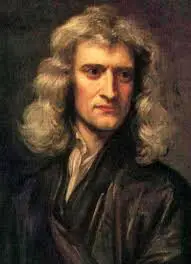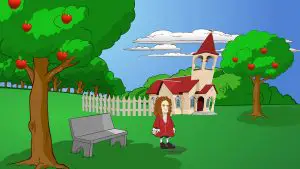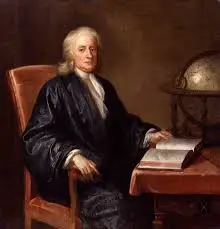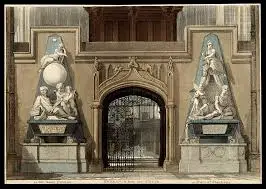Let’s discover some interesting facts about Isaac Newton, one of history’s most influential scientists.
Be sure to take our fun activity at the end to test what you’ve learned too!
Introduction
Isaac Newton was a mathematician, astronomer, physicist, and author who is considered one of the most important scientists in history.

His brilliant ideas helped launch the Scientific Revolution. The Scientific Revolution was a time of exploration and discovery that helped introduce modern science to the world.
Early Life
Isaac Newton was born in Woolsthorpe, England on Christmas Day of 1643. He was born early and was so tiny that he surprised everyone by surviving.
Isaac’s father had died three months before his birth, and Isaac’s mother remarried when he was three.
His mother went to live with her new husband, leaving Isaac with his grandparents.
When Isaac’s stepfather died seven years later, his mother returned with three children.
Two years after that, Isaac attended King’s School in Grantham. He was one of the school’s top students.

Before he could finish his studies, Isaac’s mother took him out of school to work as a farmer.
He was not a good farmer, and his mother was convinced to let Isaac return to school.
In 1661, Isaac went to Cambridge University. He paid for school by waiting tables and cleaning rooms.
But in 1665, the bubonic plague spread through England.
The university closed, and Isaac returned home.
Career
In 1669, at just 27 years old, Isaac became a professor at Cambridge University. He later became the Lucasian Chair of Mathematics, or the Lucasion Professor, one of Cambridge’s highest honors.
After his scientific discoveries made him famous, Isaac became Master of the Mint in London.
He reinvented British coins and helped track down counterfeiters (people using fake money).

Theories and Scientific Accomplishments
After returning home during the bubonic plague outbreak, Isaac began some of his most famous work on physics, optics, mathematics, and astronomy.
He worked out the principles and techniques that would later become calculus.
He began to understand the theory of gravitation and his theory of optics (that white light is made up of colors).
At first, Isaac didn’t publish any of his work. But in 1668, when another scientist published work similar to some of Isaac’s mathematical discoveries, he responded by releasing De Analysi.
De Analysi caught the attention of the mathematics community, and Isaac’s brilliance became publicly noticed for the first time.

He then invented the first reflecting telescope. This telescope produced much clearer images than other telescopes at the time, and Isaac became a member of the Royal Society (a major scientific organization).
In 1687, he published Principa Mathematica, which explained the three laws of motion that laid the foundation for modern physics.
This book made Isaac extremely famous, and he was even knighted by Queen Anne.
Artists wanted to paint Isaac’s portrait, and crowds gathered just to watch his carriage roll through the streets.
Was Isaac Newton really hit on the head with an apple?
One of the most famous stories about Isaac Newton is that he discovered gravity when an apple fell and hit him on the head.

It turns out that this story is probably an exaggeration. But it’s certainly possible that seeing apples falling from trees may have helped develop his theories of gravity.
Personal Life
Isaac Newton was a very private man, and not much is known of his personal life. He was never married and had no children.
He sometimes had emotional breakdowns and was also known for having a temper.
Isaac often argued with other scientists who he thought were trying to steal his discoveries.

In 1693, he suffered a more serious mental breakdown. He believed that some of his friends were plotting against him, but he recovered soon after.
Famous Quotes
“If I have seen further than others, it is by standing on the shoulders of giants.”
“What goes up must come down.”
“To every action there is always opposed an equal reaction.”
“Genius is patience.”
“I do not know what I may appear to the world; but to myself I seem to have been only like a boy playing on the seashore, and diverting myself now and then in finding a smoother pebble or prettier shell than ordinary, while the great ocean of truth lay all undiscovered before me.”
Later Life and Death
Isaac Newton spent the last 28 years of his life as Master of the Mint in London. He was also elected president of the Royal Society in 1703.

In 1704, he published Opticks, about his earlier work on light.
The book discussed calculus and led to arguments with Gottfried Wilhelm Leibniz, who had also discovered a system of calculus.
Eventually, the Royal Society (of which Isaac Newton was president) decided that Isaac Newton’s method of calculus had come before Leibniz’s and was the superior method.
Isaac Newton became wealthy and donated large sums of money to charity.
In his eighties, his health began to suffer.
He died at age 85 on March 20, 1727. He was buried in Westminster Abbey, and his coffin was carried by noblemen.

In later years, some of Isaac Newton’s theories were disproved by Albert Einstein. Still, much modern knowledge about mathematics and science would not exist without the work of Isaac Newton.
Read about other famous scientists.
Fun Activity Time!

>>>Isaac Newton Fun Activity<<<
Take the Isaac Newton fun fill in the blanks activity to test your knowledge of this great scientist!